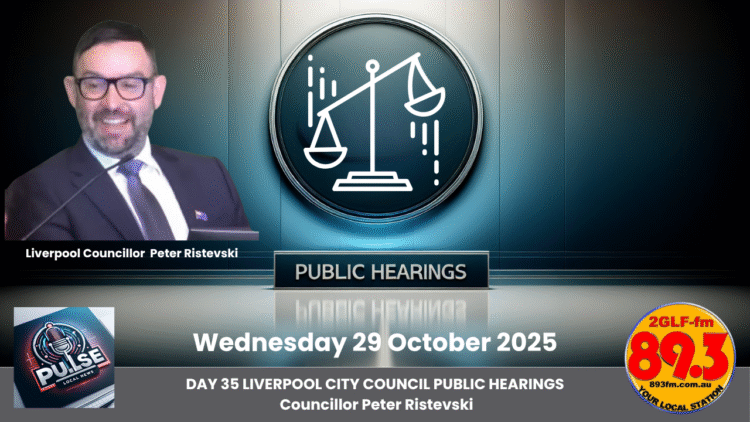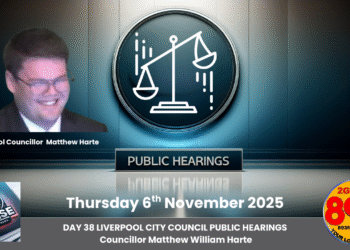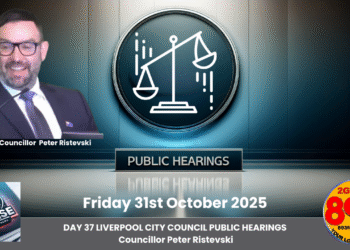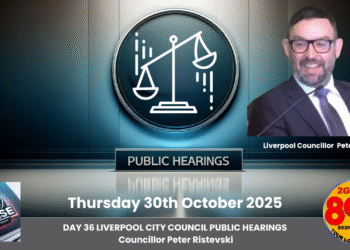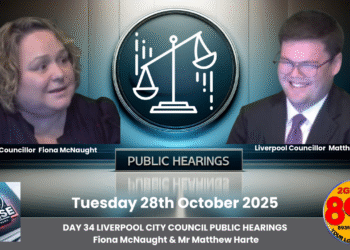On Wednesday, 29 October 2025, the Public Inquiry into Liverpool City Council, commissioned under Section 438U of the Local Government Act 1993 (NSW), held its 35th day of public hearings in Sydney. The session commenced at 10:14 AM and featured continued testimony from Councillor Peter Ristevski, focusing on code of conduct complaints, training on conduct guidelines, and his evolving approach to social media engagement. Below is a factual summary of the day’s events, followed by an analysis of matters arising that would interest ratepayers, framed around the question: Are ratepayers getting good value for money?
Summary of Proceedings
Councillor Peter Ristevski’s Testimony
- Code of Conduct Training and Awareness: Councillor Ristevski, under oath from Monday, discussed his exposure to the code of conduct during the October 2024 induction program for new councillors. He described the training as broad and general, lacking specifics, particularly on social media conduct, despite receiving a copy of the code. He noted receiving the code earlier in April 2024 via email from then-CEO Mr Ajaka in response to a complaint he lodged, though he did not read it at the time.
- Pre-Election Complaints: Ristevski confirmed making code of conduct complaints against Councillor Richard Ammoun and Mayor Ned Mannoun before becoming a councillor in October 2024 (following the September 2024 election). These complaints, lodged in April 2024, were acknowledged by the council, but he did not consult the provided code of conduct documents before filing them, citing a high volume of emails as a reason for oversight.
- Post-Election Complaints and Engagement: After becoming a councillor, Ristevski made his first official code of conduct complaint, as recorded in a council spreadsheet (entry 50), having read the code by then. He reported a high volume of complaints against him—approximately 70 to 80, with 70 related to social media—prompting a self-audit of his behavior around July 2025 to adjust his messaging tone and content.
- Interaction with Code of Conduct Reviewers: Ristevski detailed his process when facing complaints, noting he sits down with the code of conduct reviewer at the investigation stage for every complaint against him. These discussions provide clarification and help him prepare a defense, influencing his reassessment of social media engagement. Specifics of these interactions were discussed in a private session (10:43 AM to 11:00 AM) to avoid breaching non-publication orders.
- Free Speech Guidelines and Interpretation: Ristevski acknowledged reading the June 2025 guideline “Free Speech in Local Government in New South Wales” from the Office of Local Government, though it has not been mentioned or covered in council training or meetings. He struggled with interpreting key code provisions, such as the clause on actions “likely to bring the council or other council officials into disrepute,” viewing it as a broad, grey area that could stifle criticism and debate, especially pre-July 2025 when his understanding was unclear.
Matters Arising of Interest to Ratepayers: Are Ratepayers Getting Good Value for Money?
Ratepayers of Liverpool City Council are concerned about whether their contributions result in effective governance and accountable representation. The following matters from Day 35 of the inquiry highlight areas where value for money is in question:
- Governance and Resource Allocation:
- High Volume of Code of Conduct Complaints: Councillor Ristevski’s involvement in numerous complaints—both as complainant and respondent (70-80 against him, mostly social media-related)—suggests significant council resources are diverted to managing disputes rather than community priorities. Ratepayers may question if their money is well-spent when time and funds are consumed by internal conflicts instead of service delivery or infrastructure improvements.
- Impact on Council Efficiency: The need for repeated interactions with code of conduct reviewers and the processing of complaints indicate a governance burden that could delay decision-making or strain staff capacity. If ratepayer-funded operations are bogged down by such issues, the value derived from council activities diminishes, raising concerns about efficiency.
- Training and Councillor Preparedness:
- Inadequate Training on Conduct: Ristevski’s testimony reveals a lack of detailed training on the code of conduct, particularly regarding social media, during the 2024 induction. His description of the session as broad and uninformative, coupled with no council discussion of the June 2025 free speech guideline, suggests councillors may not be adequately equipped to navigate conduct expectations. Ratepayers may not receive full value if their elected officials risk breaches due to insufficient preparation, potentially leading to further complaints or legal costs.
- Delayed Self-Regulation: Ristevski’s self-audit and behavioral change around July 2025, prompted by reviewer interactions rather than proactive training, indicate a reactive rather than preventative approach to conduct issues. If ratepayer-funded training fails to instill early awareness of guidelines, the council risks ongoing issues that could have been mitigated, questioning the effectiveness of resource allocation for councillor development.
- Transparency and Public Trust:
- Interpretation of Conduct Rules: Ristevski’s difficulty in interpreting key code provisions like “bringing the council into disrepute”—viewing it as a barrier to criticism and debate—raises concerns about how councillors balance free speech with responsibility. If ratepayers perceive that conduct rules suppress legitimate critique or, conversely, fail to curb damaging behavior, trust in council transparency and accountability erodes, impacting the perceived value of their contributions.
- Pre-Election Complaints: His lodging of complaints before officially becoming a councillor (April 2024) without consulting provided conduct documents suggests a potential misuse of process or lack of due diligence. Ratepayers may question if their money supports a system where complaints are filed without full understanding, risking frivolous or unfounded actions that strain council resources.
Conclusion
The Day 35 proceedings of the Public Inquiry into Liverpool City Council reveal significant challenges in governance efficiency, councillor training, and transparency that affect whether ratepayers are receiving good value for their money. The high volume of code of conduct complaints involving Councillor Ristevski diverts resources from community-focused efforts, while inadequate training on conduct and social media guidelines risks ongoing behavioral issues among councillors. Additionally, unclear interpretations of conduct rules and pre-election complaint filings may undermine public trust in council accountability. Ratepayers deserve assurance that their contributions fund a well-prepared, transparent, and efficient council, yet evidence from this hearing indicates areas where value for money remains uncertain. As the inquiry progresses, these issues warrant scrutiny to ensure improvements at Liverpool City Council.









